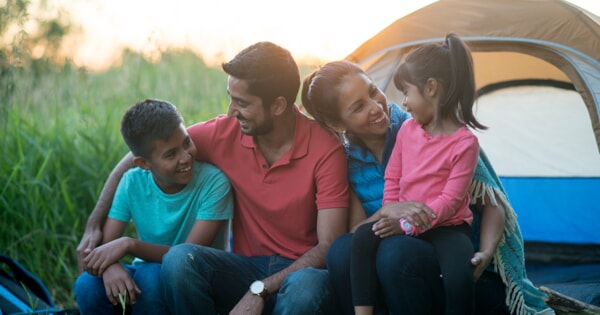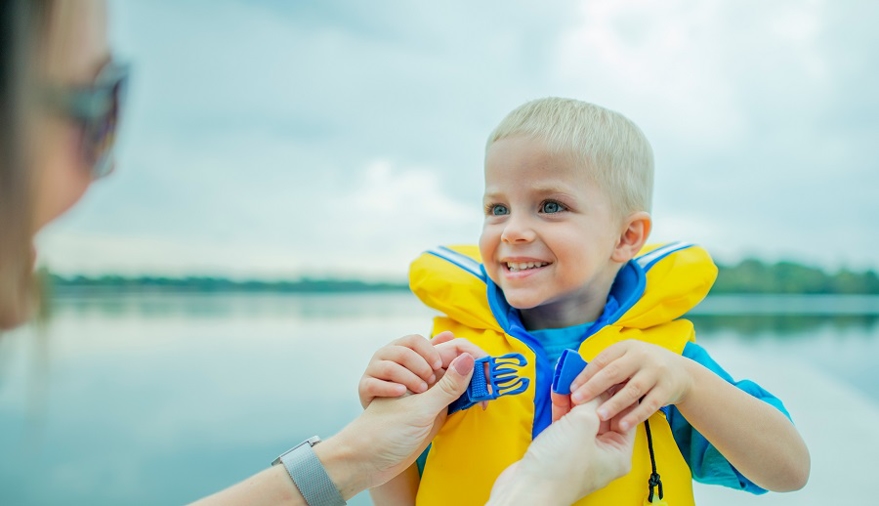Summer safety 101
May 31, 2022

Longer days, warmer temperatures and time off school usually mean summer is full of outdoor activities. While you and your family are having fun in the sun, make sure you follow a few simple practices for staying safe.
Avoid sun burns
Adults and children should wear sunscreen year-round – but it’s especially important in the summer when you’re spending more time outdoors. Apply broad-spectrum sunscreen with at least 30 SPF every day. Lather up at least 30 minutes before going outside and reapply every two hours or after going in the water. The sun’s rays can burn through clouds and windows, so be sure to wear sunscreen even on cloudy days or ones where you’re mostly indoors.
Children under 1 should be kept out of the sun as much as possible. Dress them in light-colored clothing and always cover their head. Especially avoid playing outdoors in the middle of the day, between 10 a.m. and 4 p.m., when the sun’s rays are the strongest.
Watch for heat stroke
Besides staying safe from sunburn, it’s important to protect yourself from heat exhaustion or heat stroke. Your body naturally cools itself down through sweating, but it’s easy to get dehydrated when you’re sweating a lot. Drink plenty of water, stay in the shade as much as possible, and avoid working or playing in direct sunshine.
Watch for signs of heat exhaustion, such as a rapid heart rate, pale skin, fatigue or muscle cramps. Move to the shade and apply a cool cloth or ice to the person’s forehead, face and neck. Encourage them to drink cold water.
Call 911 if you or a loved one experiences any signs of heat stroke, including:
- Body temperature 103 degrees or higher
- Dizziness, headaches or confusion
- Flushed, hot skin
- Quick breathing
Practice water safety
Whether you’re in a pool, on a boat or at the beach, it’s crucial to practice proper water safety. Young children should wear life jackets when playing around any body of water, and people of all ages should wear them when they’re on boats or swimming in a lake or ocean.
Pools should be fenced in on all four sides, with a self-latching, secure gate that’s at least four feet high. Even kiddie pools and buckets can be drowning hazards for babies and toddlers. Never leave your child alone around water and cover pools when not in use.
Know the risks of fireworks
Fireworks mishaps are among the leading reasons for summer emergency room visits. TheNational Safety Councilurges families not to use at-home fireworks under any circumstances, as they are leading causes of fires and severe injuries.
If you do use legal fireworks, follow safety guidelines closely:
- Never allow children to handle fireworks
- Never use fireworks when under the influence of alcohol or drugs
- Anyone in the close vicinity should wear safety goggles
- Only light one device at a time
- Keep a bucket of water on hand in case fireworks don’t go off or a fire starts
- Never light fireworks indoors
It’s important to know that even sparklers carry a risk of harm, especially to young children. In fact, in recent years, injuries from sparklers have accounted formore than halfof all firework-related injuries in children under 5.
Sparklers burn at around 2,000 degrees, hot enough to ignite clothing, melt some metals and cause severe burns. Avoid handing sparklers out to children, and keep a close eye on all activity any time sparklers are involved.
Stay safe from bug bites
Some bug bites are a mere nuisance. But others are more dangerous. Check under decks and eaves for wasps’ or bees’ nests before playing outside. Teach your children never to touch a nest or throw things at it. You may use insect repellant while outdoors, but avoid putting it on cuts or spraying it on the face. Instead, spray it into your hands and use your hands to apply it to your or your child’s face.
When hiking or playing in long grass, wear long sleeves and pants. Tuck pant cuffs into socks to lower the risk of getting ticks on exposed skin. Before coming inside, everyone should check their whole body for ticks.
Summer is often full of fun activities, such as family vacations where you create lifelong memories. Make sure you’re keeping everyone safe as you make the most of this season.


